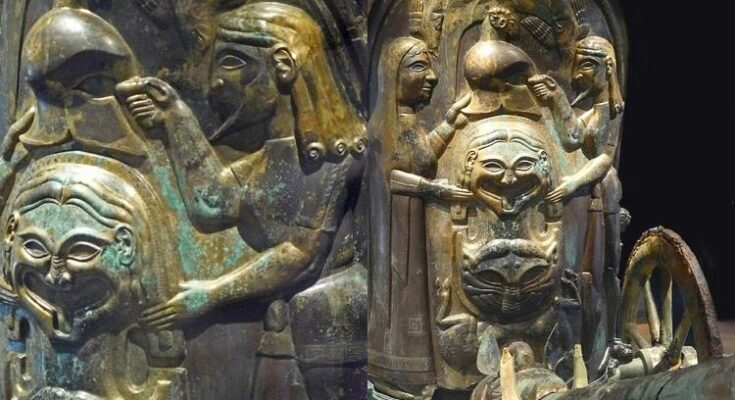The Etruscans are one of the first peoples to inhabit central Italy beginning approximately in the 8th century B.C. They have puzzled historians and linguists alike, who have always seen them as a peculiar and mysterious people.
The first witness of Etruscans and speculation on their origin by Ancient Greek historians is from the 5th century B.C. This was half a millennium after they had settled in Italy. However, there was no consensus on this matter among Greeks.
From Titus Livius and contemporary Roman scholars onwards, debate on the origin of Etruscans has continued and has been divided into two camps. There are those who believe they came from the area of Central Italy they settled in and those who thought they came from the East.
The three proposed hypotheses of the origins of the Etruscans
There are three proposed hypotheses regarding the origins of the Etruscans. The first suggests autochthonous development in situ, originating from the Villanovan culture. This view, asserted by the Greek historian Dionysius of Halicarnassus, portrays the Etruscans as indigenous to Etruria, having always inhabited the region.
The second hypothesis proposes a migration from the Aegean Sea. According to two Greek historians, Herodotus and Hellanicus of Lesbos, the Etruscans either immigrated from Lydia in Anatolia or were Pelasgians originally from Thessaly, Greece, entering Italy at the head of the Adriatic Sea in Northern Italy.
The third hypothesis, presented by Livy and Pliny the Elder, places the Etruscans in the context of the Rhaetian people to the north and other populations residing in the Alps.
Greek Influence on Etruscan Language
Linguists have seen correlations between Ancient Greek (Lemnian in particular) from around the 10th century B.C. The idea that Lemnian, spoken on the island of Lemnos in the Northern Aegean Sea, and Etruscan are related has found much academic acclaim, although all of the languages in this linguistic group are now extinct.
The relationship between the Lemnian language from the Northern Aegean and Etruscan has been observed, notably due to certain similar words and a similar grammatical structure of grammatical cases.
Rhemnian (spoken by a people in the Alps), is also considered to be part of the same linguistic group. One of the notable proponents of this theory was philologist Massimo Pallottino, who specialized in Etruscan studies. The theory was first proposed in the 19th century, but the question about their actual origins remains.

The Etruscan alphabet itself derived from the Greek Euboean script, but it wasn’t fully deciphered until recently due mostly to a lack of texts beyond funerary inscriptions (filled with names, and not very useful for the understanding of sentence structure of phonetics).
Etruscans were responsible for spreading the alphabet as we know it to Ancient Rome and influencing Latin.
The intense trade and cultural exchange allowed the Etruscans to adopt many Greek myths, customs, and potentially even to take on loan words. However, the words in question are very common words in daily use, usually the first to change as soon as a language or dialect deviates from the main one. Grammatical structure is a core characteristic that isn’t usually transposed.

Greek Influence on Etruscan Culture
The mysterious Etruscan civilization had a rather complex society. They were known for their iron working skills, although they relied on this mainly for decorative purposes and exported it for military use in the Mediterranean.
They were formed around a Dodecapolis, where every individual polis had its particular organizational system and was established in remote places, usually by the sea with access to thermal springs. These cities betray the changing customs—from carving their Necropolis on the side of mountains and building stone domes for their dead to the creation of simpler sarcophagi. Such changes came about from this seafaring people’s contact with other civilizations.

Etruscan women were known to be freer than most surrounding cultures and seemed to have a similar social standing to men, often leading to mockery by Romans as a result of their peaceful and contemplative life. However, some studies have brought to light that the genetic makeup of ancient Etruscans may be quite similar to that of the peoples of Anatolia. Other DNA studies, however, claim that Etruscans originated from the Steppes.
Exquisite gold jewelry has been detected in Etruscan cities, possibly with an Eastern twist to it. This has led some to believe they might have actually originated from Libya or North Africa. They traded with Greece and exported wines, had an inclination for crafts such as musical instruments, and were into rare goods. The Etruscans were not a group that cared much for conquest but preferred to remain occupied with poetry and music.



